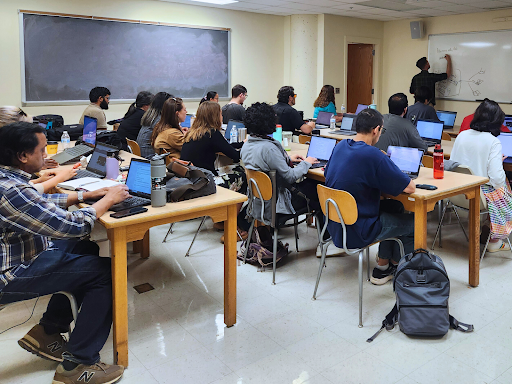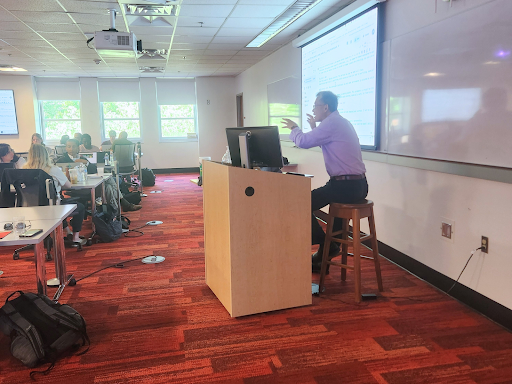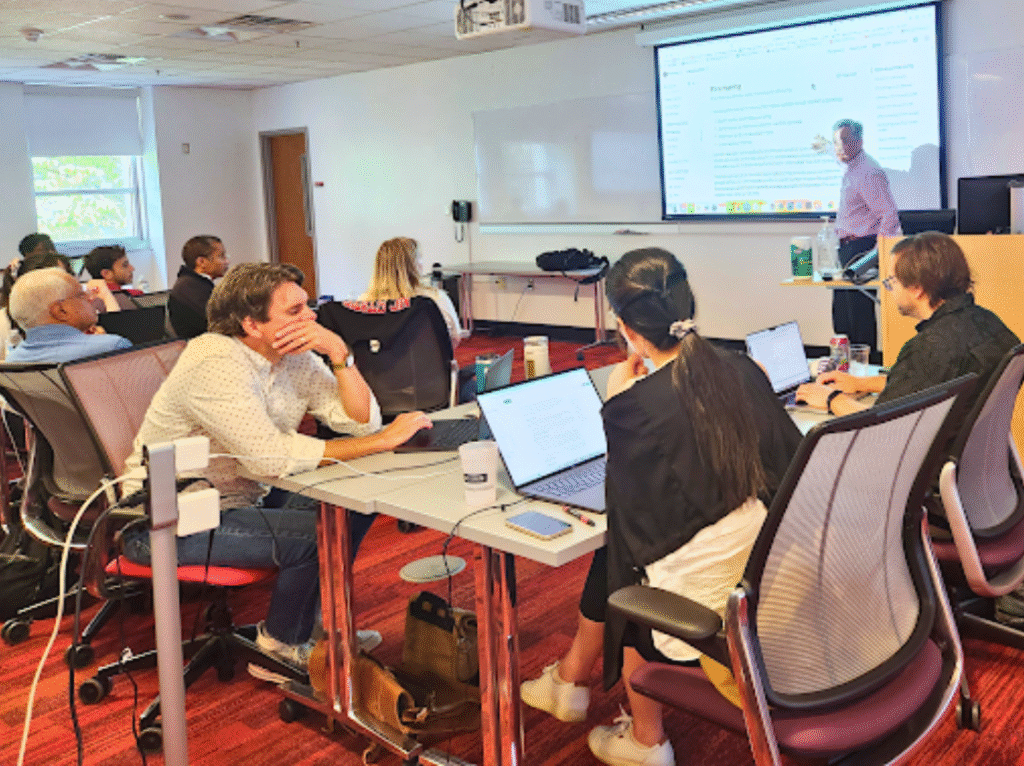NC State’s Data Science and AI Academy Upskills the Wolfpack with Practical AI
The AI landscape is rapidly evolving, and NC State's Data Science and AI Academy (DSA) is equipping the Wolfpack to thrive within it. Explore how the DSA's hands-on, project-based training empowers professionals from all fields to apply AI directly to their work, driving real-world change and tangible outcomes.

The modern workplace is rapidly being reshaped by data science and artificial intelligence (AI). At NC State University’s Data Science and AI Academy (DSA), we’re not just watching this transformation; we’re actively upskilling the Wolfpack to lead the charge. Our Data and AI at Work trainings empower professionals to seamlessly integrate cutting-edge data and AI into their daily tasks, ensuring immediate impact and tangible results for both individuals and organizations.
Data and AI at Work is the DSA’s suite of customized training opportunities. We partner with interdisciplinary groups—from industry leaders and government agencies to nonprofits and university departments—to tackle real-world data challenges.
Our programs are built on the All Campus Data Science and AI Project-Based Teaching and Learning (ADAPT) Model, focusing on hands-on, project-based sessions. This means we don’t just teach theory; we help teams build actual solutions. We tailor learning precisely to your tools and data, guaranteeing direct relevance. Plus, our innovative train-the-trainer program equips your staff to become internal AI experts, fostering sustainable growth within your organization.

Our recent “Hands-on Training for AI/LLM Applications for Research” sessions, led by Dr. Paul Liu, clearly highlighted the urgent demand for AI and large language model (LLM) skills. This training course was initially designed as a single session with a maximum capacity of 50 participants, but due to overwhelming demand, we added a second session. More than 80 participants from across campus, ranging from beginners to seasoned data scientists, shared a common goal: to apply data and AI in context.
The range of attendees, from novices to experts, showcased AI’s broad reach and the need for continuous learning. Beginners’ questions often reinforced core concepts, while more experienced participants explored advanced scenarios, pushing the boundaries of the training and demonstrating exciting future possibilities. This dynamic mirrored real-world team collaboration, proving that AI skills are transformative across all roles.
As Dr. Liu observed, “This AI and LLM training experience demonstrated that hands-on, application-driven learning is essential for equipping a modern workforce with data science and AI skills. The workshop showed how AI is no longer a niche area for computer scientists—it’s now a critical skillset across disciplines, from veterinary science to engineering and public policy.”
A key takeaway was the immediate applicability of practical AI, whether through APIs, local models, or web tools like Streamlit and Flask, directly to workplace challenges. Participants highlighted how the training successfully bridged the gap between abstract concepts and real-world implementation, empowering them to integrate AI into research workflows, automate data processing, and even develop tools for client interaction.
Dr. Liu’s training is meticulously designed for real-world applicability. Every concept is accompanied by Python notebooks for hands-on coding and projects, allowing learners to instantly apply what they’ve learned. The curriculum follows a progressive complexity, starting with LLM basics and advancing to sophisticated topics like Retrieval-Augmented Generation (RAG) and fine-tuning.

The first session adhered to the original plan of two full consecutive days, totaling 16 hours of training. Based on participant feedback, we restructured the second session into four half-days, providing attendees with more time to digest the content and apply what they learned after each segment. Students’ post-training evaluations and feedback indicate the half-day model worked much better for them. The sessions emphasize tool diversity, ensuring participants gain experience with various industry-standard tools. Before the workshop, a dedicated Q&A session helps align expectations and set up technical environments, maximizing valuable in-session learning time. This structured approach shows that even beginners can quickly gain proficiency in AI when provided with the right support.
Participant Andrew Petersen, an NC State Data Sciences Research Specialist, noted that “staff can use these tools to add value to their services and improve efficiency… based on what we learned, we created a chatbot prototype that pulls information directly from the online documentation.”
Vidisha Shedge, an Automation Test Engineer and NC State College of Engineering graduate student, highlighted the broader implications for workforce readiness: “This workshop demonstrated that AI and data science skills aren’t just for technical roles—they’re transformative across all workplace functions… For organizations, embracing data science and AI training isn’t merely about adapting; it’s about confidently leading into the future.”
Seizing the AI Era: A Call to Action for Organizations
For organizations navigating the evolving digital landscape, the message is clear: AI literacy is now a foundational imperative, not an optional skill. Investing in practical AI upskilling translates directly to faster innovation cycles, more efficient data workflows, and a workforce better prepared for AI-driven disruption. Employees equipped with this knowledge can build internal tools, fine-tune models with their data, and design secure, cost-effective local applications, reducing reliance on external platforms.

The DSA urges organizations to move beyond mere AI awareness. We advocate for immersive, practical training that empowers employees to build and deploy real-world solutions using their data. The return on investment is compelling: swifter decision-making, enhanced automation, and a workforce not just prepared but actively shaping the AI era. Crucially, this investment cultivates internal capacity for innovation, allowing your teams to transcend simply using AI and start creating with it. At the DSA, we’re committed to fostering a future where data and AI are integral components of a thriving and innovative workforce across all sectors.
To explore how the DSA can partner with your organization to address data challenges and empower your workforce, contact us at datascienceacademy@ncsu.edu.


